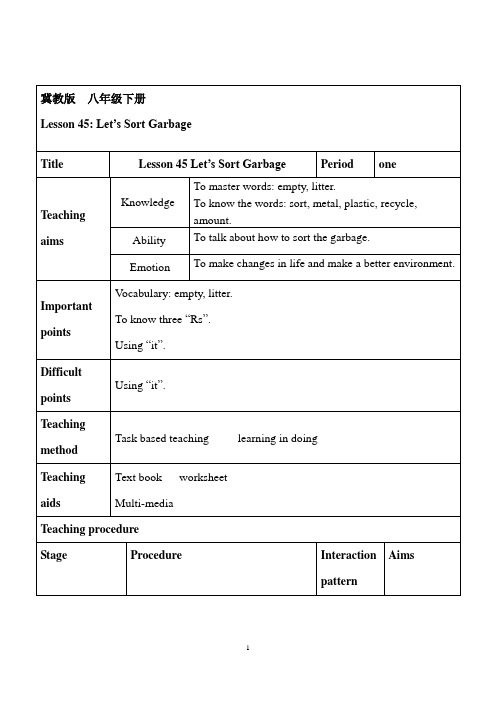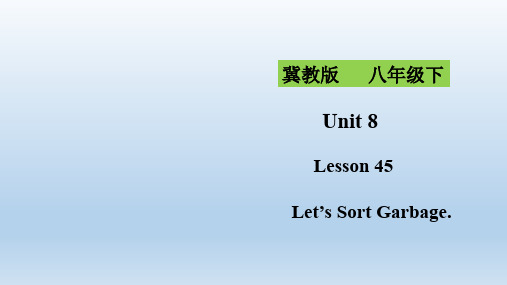冀教八年级英语下Lesson45Let’s Sort Garbage公开课优质课比赛获奖课件
- 格式:ppt
- 大小:2.19 MB
- 文档页数:16



冀教版英语八下Unit 8《Lesson 45 Let’s Sort Garbage》教学设计一. 教材分析冀教版英语八下Unit 8《Lesson 45 Let’s Sort Garbage》是一节关于垃圾分类的英语课程。
通过本节课的学习,学生将能够掌握与垃圾分类相关的词汇和句型,学会如何用英语描述垃圾分类的方法和重要性。
教材通过图片、对话和任务型活动等多种形式,使学生在轻松愉快的氛围中学习英语,提高他们的环保意识。
二. 学情分析本节课的对象为八年级学生,他们已经掌握了基本的英语语法和词汇,具备一定的听说读写能力。
同时,他们对于垃圾分类这一话题也有一定的了解,这为课程的开展奠定了基础。
但部分学生对英语口语表达仍存在恐惧心理,需要在课堂上给予更多的鼓励和练习机会。
三. 教学目标1.知识目标:学生能够掌握与垃圾分类相关的词汇和句型,了解垃圾分类的方法和重要性。
2.能力目标:学生能够用英语进行简单的垃圾分类描述,提高他们的英语口语表达能力。
3.情感目标:学生能够树立环保意识,养成垃圾分类的好习惯。
四. 教学重难点1.重点:垃圾分类相关词汇的掌握和运用。
2.难点:如何用英语描述垃圾分类的方法和重要性。
五. 教学方法1.任务型教学法:通过设置具体的垃圾分类任务,让学生在完成任务的过程中学习和运用英语。
2.情境教学法:创设生活情境,让学生在真实的环境中学习英语。
3.激励评价法:鼓励学生积极参与课堂活动,提高他们的自信心和学习兴趣。
六. 教学准备1.教学课件:制作包含图片、动画和任务的课件,生动展示垃圾分类的内容。
2.教学材料:准备垃圾分类的实物材料,如不同类型的垃圾袋、垃圾卡片等。
3.录音设备:用于播放听力材料。
七. 教学过程1.导入(5分钟)利用课件展示我国垃圾分类的现状,引导学生关注垃圾分类的重要性。
同时,让学生谈谈自己对垃圾分类的认识和做法,激发他们的学习兴趣。
2.呈现(10分钟)通过课件和实物展示,呈现垃圾分类的相关词汇和句型。


八年级英语下册Unit 8 Save Our World Lesson 45 Let’s Sort Garbage教案(新版)冀教版编辑整理:尊敬的读者朋友们:这里是精品文档编辑中心,本文档内容是由我和我的同事精心编辑整理后发布的,发布之前我们对文中内容进行仔细校对,但是难免会有疏漏的地方,但是任然希望(八年级英语下册Unit 8 Save Our World Lesson 45 Let’s Sort Garbage教案(新版)冀教版)的内容能够给您的工作和学习带来便利。
同时也真诚的希望收到您的建议和反馈,这将是我们进步的源泉,前进的动力。
本文可编辑可修改,如果觉得对您有帮助请收藏以便随时查阅,最后祝您生活愉快业绩进步,以下为八年级英语下册Unit 8 Save Our World Lesson 45 Let’s Sort Garbage教案(新版)冀教版的全部内容。
Unit 7 Know Our WorldLesson 45 Let’s Sort Garbage!本课围绕环境来展开阅读,号召大家采取有效措施和从生活小事做起,提高学生珍惜和爱护地球的情感意识.【知识与能力目标】1. Master the new words and expressions: sort, metal, weight, percent2. Call on the students to take actions to protect our environment。
3。
Learn about the pollution problems in our life.【过程与方法目标】掌握阅读的技巧,了解“greenho use effect" 的背景知识和如何做绿色消费者来保护我们的地【情感态度价值观目标】本课围绕环境来展开阅读,号召大家采取有效措施和从生活小事做起,提高学生珍惜和爱护地球的情感意识。
【教学重点】1. Offering help。

Unit 8 Save Our World lesson 45 Let's Sort Garbage Teaching Aims:1. Knowledge Objects:1). Learn and master the following words and expressions:sort, metal, heaven, weight, truck, object, picnic, take a walk;s: plastic, packaging.3). Offering help.2. Ability Objects:active part in activities about collecting and sorting garbage, and think about recycling and make a poster that describles steps for personal action.3. Moral Objects:Learn about the pollution problems in our life. Call on the students to take actions to protect our environment.Teaching Important Points:2. Learn to offer help.3. Do the project and call on the students to take actions toprotect our environment.Teaching Difficult Points:expressions.2. Think about recycling and make a poster that describles steps for personal action.Teaching Tools: Multimedia; Some Pictures.Teaching Methods:Immersion Reading Approach; Situational Approach; Discussing; Co-operative Learning; Project ApproachTeaching Procedure:Class Opening:1.Check the homework.2.Ask two or three students to read aloud their written proposals to their parents or neighbours. Encourage others to add their own suggestions.Student Book:Step 1. Lead in: What kinds of rubbish do you often throw every day? Can you name them? What can be recycled? Ask the students to have a discussion about the kind of rubbish and at the same time new words can be taught by talking about some given pictures.Step 2. Play the audiotape. Ask the students to listen to the tape while thinking about the question:What makes the most garbage?Step 3. Immersion Reading:1. Have the students read the dialogue quickly and finish Ex.2 in the activity book.2. Read the dialogue carefully again and have a further study about it. Encourage the students to solve their problems in the reading by co-operative learning.Step 5. Focus Explanation and Practice:In order to help the students understand the dialogue correctly and master the mastery contents, according to their study, I’ll explain and practice some of the following language points:1. Jenny has emptied two bags of garbage onto the floor.empty 可作形容词或动词,意思是”空的;倒空”.E.g. There is an empty bottle on the table.Can you empty the plates for me?2. Can I help you sort it?◆提供帮助常用句式: Can I help you? / What can I do for you? 答语: Yes, please. / No, thanks.◆sort 可作名词或动词, 意思是”类;分类”。
Unit 8 Save Our World lesson 45 Let's Sort Garbage Teaching Aims:1. Knowledge Objec ts:1). Learn and master the following words and expressions:sort, metal, heaven, weight, truck, object, picnic, take a walk;2). Come into contact with the following words: plastic, packaging.3). Offering help.2. Ability Objects:Be able to hear the key information of the dialogue; Be able to read, comprehend and act the dialogue correctly; Be able to take an active part in activities about collecting and s orting garbage, and think about recycling and make a poster that describles steps for personal action.3. Moral Objects:Learn about the pollution problems in our life. Call on the students to take actions to protect our environment.Teaching Important Points:1. Read, comprehend and act the dialogue correctly, learn and master the mastery words and expressions.2. Learn to offer help.3. Do the project and call on the students to take actions to protect our environment.Teaching Difficult Points:1. Comprehend the dialogue correctly, master the mastery words and expressions.2. Think about recycling and make a poster that describ les steps for personal action.Teaching Tools: Multimedia; Some Pictures.Teaching Methods:Immersion Reading; Communicative Approach; Situational Approach; Discussing;Co-operative Learning; Project ApproachTeaching Procedure:Class Opening:1.Check the homework.2.Ask two or three students to read aloud their written proposals to their parents or neighbours. Encourage others to add their own suggestions.Student Book:Step 1. Lead in: What kinds of rubbish do you often throw every day? Can you name them? What can be recycled? Ask the students to have a discussion about the kind of rubbish and at the same time new words can be taught by talking about some given pictures.Step 2. Play the audiotape. Ask the students to listen to the tape while thinking about the question:What makes the most garbage?Step 3. Immersion Reading:1. Have the students read the dialogue quickly and finish Ex.2 in the activity book.2. Read the dialogue carefully again and have a further study about it. Encourage the students to solve their problems in the reading by co-operative learning.Step 5. Focus Explanation and Practice:In order to help the students understand the dialogue correctly and master the mastery contents, according to their study, I’ll explain and practice some of the following language points:1. Jenny has emptied two bags of garbage onto the floor.empty 可作形容词或动词,意思是”空的;倒空”.E.g. There is an empty bottle on the table.Can you empty the plates for me?2. Can I help you sort it?◆提供帮助常用句式: Can I help you? / What can I do for you? 答语: Yes, please. / No, thanks.◆ sort 可作名词或动词, 意思是”类;分类”。